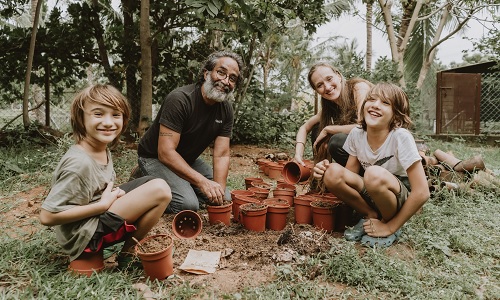N.B. Nair
Indian technocrats look for greener pastures abroad for big pay packets and better, comfortable living standards. A majority of them prefer to settle down in the countries of their employment.
In contrast, an Indian technocrat and his Dutch wife decided to quit their cushy jobs in Amsterdam and settle down in rural environs close to Chennai in Tamil Nadu. Their village land had no uninterrupted power supply, potable drinking water had to be fetched from some distance away and they had to fend off snakes and other reptiles.
But for Shammy Jacob and his wife Charlotte Van’t Klooster, it was a dream to live in harmony with nature.
“We wanted to make sure our children have a very grounded upbringing and they can grow up close to nature. I really understand the value of everything, whether it is vegetable or milk. They should also know the background of it, how difficult is to bring it,” Jacob told Inspirational India.
“I was in between jobs and the question was whether we should continue for another 25 years like this or do we make a decision and move to India where we have the luxury of having the land and doing something out of it. We took the latter decision not to pursue another 20-30 years and we quit our practice and left,” Jacob added.
Jacob and Charlotte traded their home in Amsterdam and shifted to their four-acre farm in Thalambur, 25 kilometres from Chennai.
While Jacob is an expert in the sustainability sector, Charlottee is an anthropologist and biologist with a doctorate in traditional medicinal plants.
Though they bought the land in the 1980s, the couple finally shifted to Tamil Nadu lock, stock, and barrel only in 2013.
“When we moved here and started making this our home, there was absolutely nothing around here. There were no roads – we had to go for about five kilometres for a can of water. But that was what we wanted and enjoyed it every day,” said Jacob about their transition from Amsterdam – a heritage city, now developed into a modern international hub.
“For me it was a natural change, as we had been here for holidays, and I really loved the place. Since I am a biologist, I liked the rural surroundings very much. This is the right place for me, instead of living in a big city. We had everything we need to start here. Therefore, it was a very natural transition. Our children had also been to this place when they were one and three years. They are always out with us, when we are planting brinjals or collecting brinjals, enjoying it. Now this is their home,” pitched in Charlotte.
Jacob said, it was a big shift in their lifestyles from having the latest car in Amsterdam and being able to drive to Paris etc. once a month. But it was a conscious decision that these were really not needed.
While their savings helped them sustain a living, both Jacob and Charlotte continued their consultancies in their respective areas as running the farm was not profitable.
The young couple set up an innovation centre, where they facilitate any innovation session, design thinking to maximise creating potential, and organisational coaching. They hold workshops for corporates and children.
“We provide an eco-friendly farm experience where you can help milk the cows and feed the ducks. They get an opportunity to see what they get. That’s inspiring for the children,” shares Shammy.
The primary innovation centre conducts workshops for children in various skill development courses of the United Nations to ensure that every individual can make a contribution to a better world, added Charlottee. “We try to inspire children, and parents to come here and enjoy nature,” she said. Charlottee, well-versed in various healing methods using energy, also conducts meditation and healing sessions on the farm.
The farm now has over 300 trees, more than 30 varieties of fruits and vegetables, Gir cows, country chickens and ducks.
After meeting their requirements, fruits, vegetables, and milk are sold to the neighbouring villagers and gated communities. They have also opened a store on the farm. Besides products from their farm, Jacob and Charlotte also help villagers to sell their organic farm output through the shop. “We don’t say it is organic certified, but trust certified,” added Jacob.
Jacob and Charlotte themselves deliver milk to the villagers and gated communities in the neighbourhood.
“You can’t look at this farm as a business, look at it as a lifestyle, which we chose. Instead of making money and travelling or instead of making money and playing golf, we chose to do what we wanted to do and put it back into the soil,” Jacob reasoned their decision to return to the roots.
Since the power supply in the area was erratic, Jacob had to invest in solar power to provide an international experience to trainees from the Corporate. They now have a 6.2 KW solar panel running in the farm so that they don’t entirely have to depend on the public utility for power.
In the nutshell, they do organic farming, sell organic products, train children and corporate executives in personality development and offer homestay at their farm to inspire others to live close to nature.
“For us, it is to inspire people to understand from where we come from; they don’t need to have a big farm, what they need is do what they are good at at their homes and create a community,” said Jacob elaborating his philosophy.
“Jacob & Klooster Farms is not just a place. It’s the realisation of our hopes and dreams to live more responsibly. A lifestyle we wish to share with many others.”
Image courtesy: Jacob & Klooster Farms

